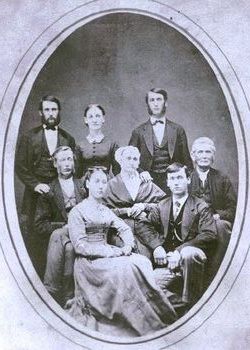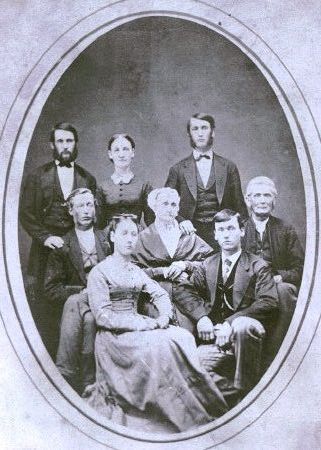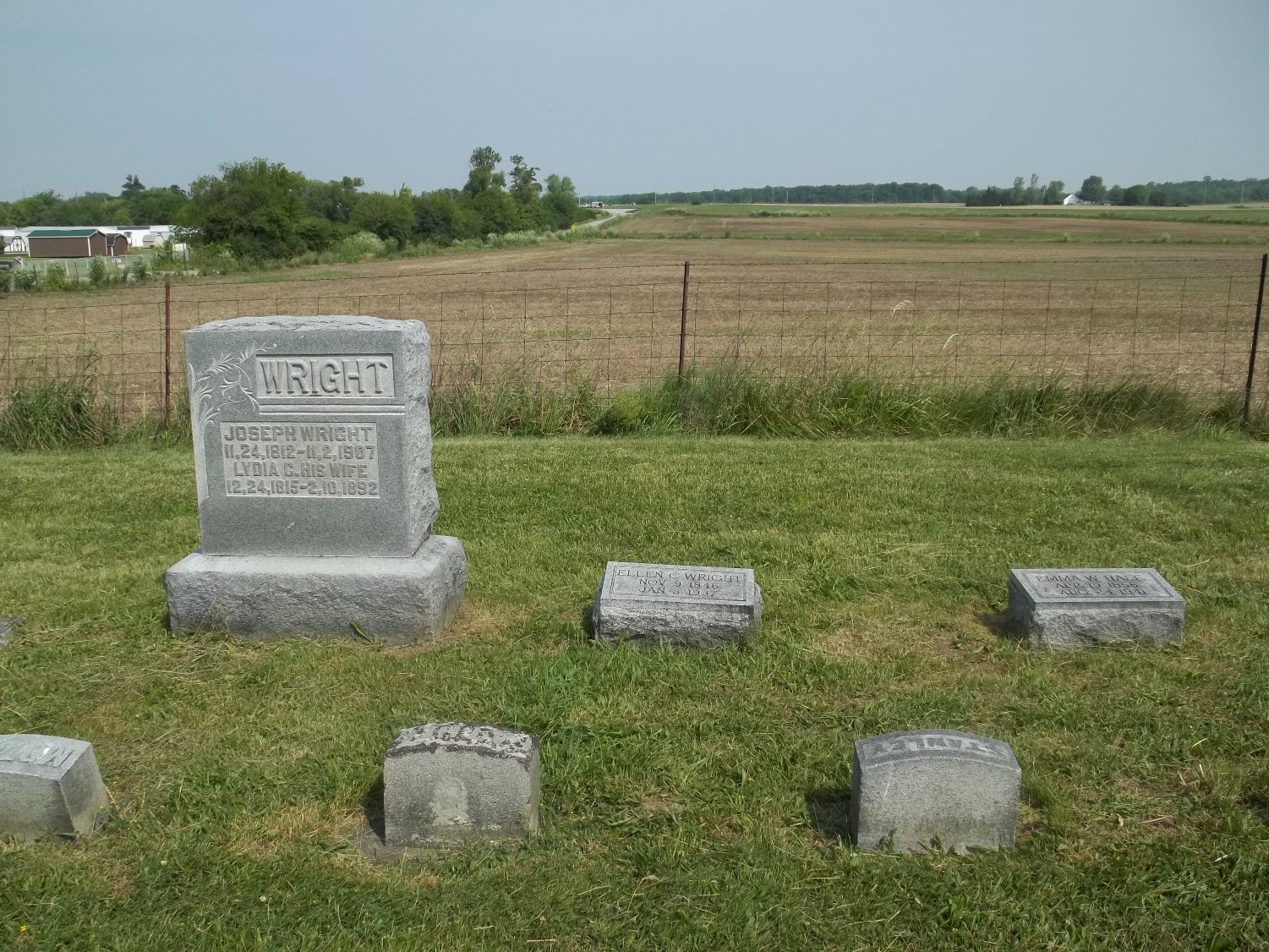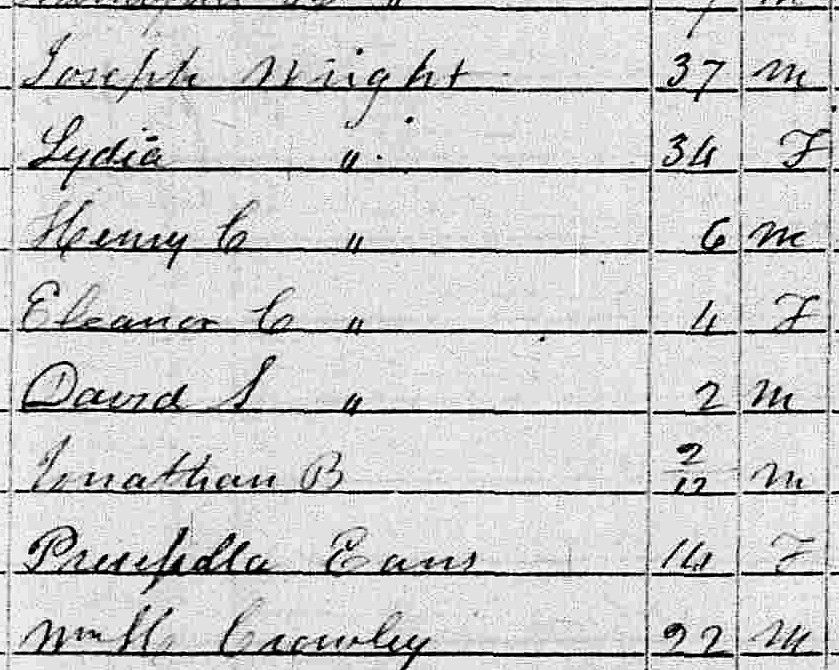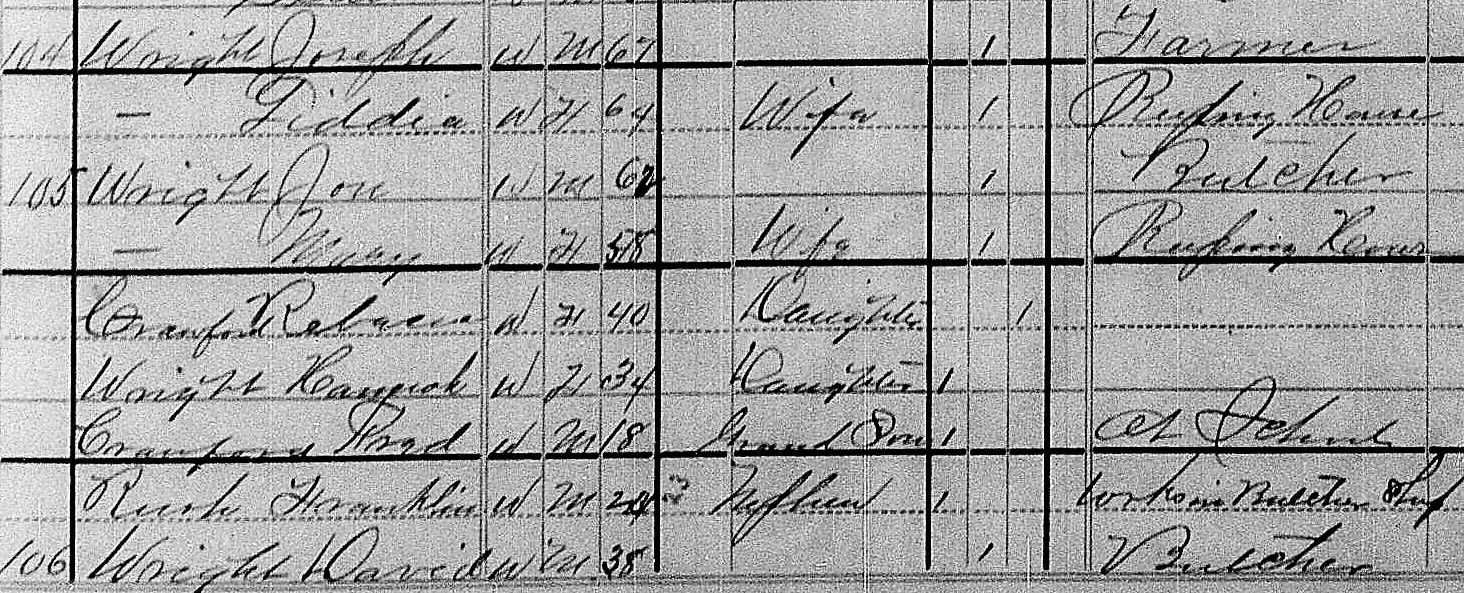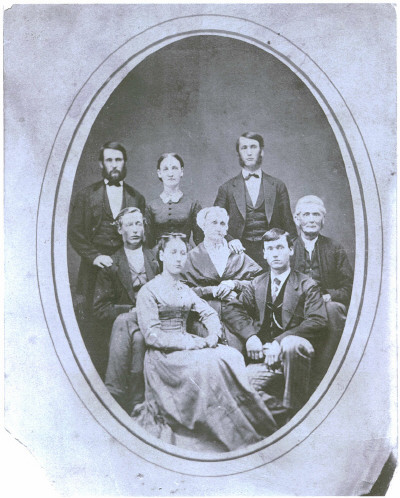---------------------
Joseph Wright was born 11th mo. 24th, 1812. He was the son of John and Hannah Gilbert Wright, and was born in Columbiana Co. Ohio. The father, John Wright was born in Virginia, Bedford Co. He was the son of Joseph and Elizabeth (------), who moved to Ohio when John was just entering manhood. The father of Joseph was a large slaveholder, who when he came to distribute his property among his children said that Joseph had moved to Ohio and joined the Quakers and being opposed to slavery would not want any of his property, so the family was poor. [The father of the Joseph Wright who moved from Bedford Co, VA, to Columbiana Co, OH, in 1802/1803 was John Wright, who died in Bedford Co, VA, in 1814. He did indeed own slaves, but, contrary to the implication of the statement, John willed money to his son, Joseph, and obviously it would have been easier to send money to Joseph in Ohio rather than land or slaves.]
Joseph's children were Nancy Johnson (Wright), Elizabeth Moreland, Martha Moreland, Charity Manker [the correct name was Mankin], Judith Whinery, Thomas, Joseph, John, and Benjamin.
Hannah Gilbert was the daughter of Joseph and Ann Gilbert. They came from Loudoun Co., Va., after Hannah was grown and settled in Columbiana Co. Their children were Lydia Davis and Polly Sinclair, Sallie and Betsy, Hannah Wright Coffin, Priscilla Milner, afterwards Sinclair, Ann Marsh, Robert and Rebecca. (Sallie and Betsy married the same man. Joseph [this is a reference to Joseph Gilbert, who married Ann Marsh at Old Swedes' Church in Philadelphia] married Ann Marsh.)
The children of Thomas Wright [this is an error -- it should be Thomas Gilbert, not Thomas Wright; I think this Thomas Gilbert was Hannah Gilbert Wright Coffin's eldest brother, and that is why his family was mentioned]], who married Polly Sinclair were: Abbie, Charity, Reason, Jesse, Joseph, Mahala, and Nathan who married Amy McDavid. [The names of Thomas WRIGHT's children should appear here but do not.]
My father's earliest recollections [are?] of living in Columbiana Co., Ohio where he was born. He remembers but one event in his own life. His little cousin died, whose home was just across the fields from his own. He was left at home by his parents when they went to attend the funeral. He remembers of following them, of going into the house and of seeing the white sheet over the chairs on which the dead child lay.
In the spring of 1816 they removed to Highland County. Uncle David was a year and a half old, just beginning to talk plainly. Father was three and a half, but does not remember of moving. They first lived a few months in the Elijah Johnson place, (now the James Roads place), then moved to a house north of the stone house so long occupied by Gilbert Holmes.
The first memory of this home is the birth of his little brother Jonathan. The older children were sent to a neighbor, Uncle Thomas Rayborn, and when Mrs. Rayborn came home she told them there was a baby at their house. "Where did they get it?" was the first question. "Oh, in the meadow," was the answer. Afterwards the children found a scratch on the baby's hand and decided it came from the briars in the meadow.
He remembers of seeing a herd of wild deer run past their cabin, and of gathering peaches from the trees southeast of the home.
He was told of his parents that once when he was a little fellow out with his father at work he was told to go into the house and ask his mother to send by him to his father the sharpest case knife she had. He went and told her that he wanted the sharpest casest knife she had. Once when he wanted more milk his father told him that milk was scarce. "I like scarce milk," was his reply.
A school house stood on the road near Clousers. His father taught one quarter here and he went to school to him. Here he knew the Hussey girls and was petted by them.
When nine years old his father died after a few days of painful illness, perhaps a pleurisy fever.
The mother was left with five small children and nothing ahead. She was not a member of Friends when she married John Wright, but she afterwards became one requesting for her older children. [This is true, but Hannah's mother, Ann Marsh Gilbert, shows up in Quaker records moving from Pennsylvania to Loudoun Co., Va.]
On the death of her husband the church members rallied around her and built her a cabin on the John Lewis Place, just sough of the house and east of our old home. She kept her oldest child, Ann, and the two youngest--Jonathan and Rebecca, and early and late she and Ann spun and wove and sewed for the neighbors and thus eked out a living by hard toil. When the seven stars were visible they would begin to work at night.
The two boys, Joseph and David, were taken by a Friend, Samuel Coffin, [Coffin was typed incorrectly as Collin on the typescript Mrs. Foor had] and given a home.
After the boys had been at Coffin's for a week or so, Samuel went to town and brought each of them home a knife, white handled. Father's knife had a bird and tree on it. When they had been away from home about two weeks they were permitted to go and see their mother. When they reached the house they ran in and each threw his knife in his mother's lap. The tears ran down her cheeks at sight of her fatherless boys and Joseph wondered what his mother should cry because they had white-handled knives.
Father was quick-tempered but serious and sedate and was always regarded as a good boy. When in his sixteenth year he heard people talk of what a good boy Samuel Coffin had. This led him to feel he was not good and that he was appearing to be something he was not. This was a source of anxiety to him and for three or four weeks he was under conviction for his sins.
At the end of this time as he was coming home from his work, on passing the sheds between the barn and the house there came over him a joy and peace that filled his soul and marked the hour of his conversion. Ever after this he led a Christian life, only occasionally yielding to discouragement. At the time of the separation of Hixsite and Orthodox Jehu Lewis went with the former but Hannah Wright being orthodox, the Friends who held that faith once more came to her aid and built her a house on Samuel Coffin's place. There she lived until in later years she became the wife of Samuel Coffin.
When father was about three years old he climbed upon a big spinning wheel and put his head out of a window to see a horse and her little colt. The wolves had been disturbing the colt and the mother horse was ready to defend her young. She caught the child on the side of his face with her teeth and drew him out upon the ground from which he was rescued with a wound that left a scar which we could trace to the end of his life.
===========
Obituary in THE AMERICAN FRIEND, Twelfth Month 10, 1907, p. 815:
JOSEPH WRIGHT
Joseph Wright, son of John and Hannah Wright, was born in Columbiana County, Ohio, Eleventh month 24, 1812, and died at the home of his elder daughter, Ellen C. Wright, in Wilmington, Ohio, Eleventh month 2, 1907, having lived until within twenty-two days of his ninety-fifth birthday.
When he was three years old, his parents moved to Highland County, where his father engaged in teaching, and where he sometimes exercised a gift in the ministry. At the age of nine, he was left an orphan [only his father died -- not his mother], and was bound to Samuel Coffin, a Friend of unusual force, both in intelligence and spirituality. Here he was given a good home, and a year's schooling in the winter months. In his sixteenth year he overheard some one speaking of him as a good boy. He felt that he was not good, and was condemned for seeming to be what he was not, and his conviction of sin did not leave him till conversion brought peace to his heart, and so his religious life began.
After he came of age he went to the Friends High School at Harveysburg, and made some advancement in the course of study there. The next ten years were chiefly spent in teaching, till there were hundreds of young people who had pleasant memories of him as a teacher. He was through all his long life a constant reader of good literature, and so spent many happy hours, and acquired a deep and liberal culture like that of a scholar.
At the age of twenty-seven, he married Lydia Cowgill and lived with her in happy union more than fifty years. They had seven children, six of whom lived till after the celebration of the golden wedding, and four of whom still survive. These four all followed the example of their father in choosing a calling. Ellen C. has been for more than thirty years a professor in Wilmington College. David S. has been for the same time a professor in the Iowa State Normal School, and Jonathan B. is superintendent of schools at Harveysburg, Ohio, and Emma Hale, the youngest daughter, taught in the public schools a number of years.
He first settled at Fall Creek, but soon moved to Clear Creek. Here, as his father had done before him, he felt called to public service, and his efforts met with such acceptance that in a year or two his gift was acknowledged and he was recorded a minister of the Gospel. He devoted much time and thought to this work and rarely in his life missed a business or a mid-week meeting. Occasionally he visited with a minute meetings in other States and in Ohio.
Though he was brought up under the old regime, and was past middle life when the revival period came, he was in hearty sympathy with it, and one its most unflinching champions. He was one of the first of our ministers to engage in union revival services, and later he labored zealously in Quaker revivals, and hundreds were converted under his preaching.
As long as he could drive he was constantly called upon to attend funerals, and he performed many marriage ceremonies. He was remarkably free from self-seeking, but he took an innocent, child-like delight in the appreciation and love of his friends. He was particularly free from envy and jealousy, and he delighted in the ministry of men whom he regarded as more gifted than himself, and his latter years, when he felt his own powers declining, were not unhappy years, though attended by the giving up of work in which he had found great delight.
He was one of the founders of Wilmington College, and for twenty years served on its Board of Managers.
His life, though it had its hardships and its provings, was remarkably full of sunshine. He always loved a jest, and he sometimes called that his weakness, but it was an element of strength in his character, for as it bubbled up spontaneously in his talk it convinced everyone there is nothing gloomy or morose in a healthy religious experience. His life was remarkably free from sickness and pain, and his death was a falling asleep. When far past ninety his mental and physical sanity was surprising.
In all the later years of his ministry he preached the Gospel of complete deliverance from sin and exemplified it by such a life as convinced me of its blessed possibility. His life was the greatest sermon he ever preached. Such a life is the most cogent argument for Christianity. It has in it a logic so convincing that unbelief is impossible within the reach of its influence.
======================
HISTORY OF ROSS AND HIGHLAND COUNTIES, OHIO (1880), p. 494, in a section on Penn Township, says, "Joseph Wright came to Penn from Columbia [sic -- it should be Columbiana] county, to which place he originally emigrated from Virginia, in the year 1816. When he first came he lived, with his father, on the place now owned by Gilbert Holmes. He has, for some yers, been a preacher of the orthodox Friends, and has recently removed to New Vienna."
=======================
CAUTION: Elsie Johnson Ayres book, "Highland Pioneer Sketches & Families Genealogies," includes confusing paragraphs about this family on pp. 316-317. John Wright (1786-1822) is the one Mrs. Ayres meant on p. 316 where she wrote, "John Wright was the father of a large family that included a son Joseph." At the bottom of that page she mentions "Jesse, brother of Edgar Wright, married Jemima Haworth...." Jesse and Edgar are from a DIFFERENT Wright family [unrelated, so far as is known, to John Wright (1786-1822]. Then, on p. 317, Mrs. Ayres writes, "John Wright, father of a large family [exactly what she has already said on p. 316], was a teacher as well as a Quaker minister." Again, that is about John Wright (1786-1822). And then she writes, "He taught for many years in Highland Co. before helping to establish Wilmington College. He was not only one of its founders, but served on the Board of Managers for some twenty years." This, unfortunately, is FALSE. John Wright (1786-1822) came to Highland Co in 1816 and died in 1822, so it would have been impossible for him to have taught for "many years in Highland Co." Mrs. Ayres has confused John Wright (1786-1822) with his son Joseph Wright (1812-1907), who was the one who played a role in the founding of Wilmington College and was associated with it thereafter.
---------------------
Joseph Wright was born 11th mo. 24th, 1812. He was the son of John and Hannah Gilbert Wright, and was born in Columbiana Co. Ohio. The father, John Wright was born in Virginia, Bedford Co. He was the son of Joseph and Elizabeth (------), who moved to Ohio when John was just entering manhood. The father of Joseph was a large slaveholder, who when he came to distribute his property among his children said that Joseph had moved to Ohio and joined the Quakers and being opposed to slavery would not want any of his property, so the family was poor. [The father of the Joseph Wright who moved from Bedford Co, VA, to Columbiana Co, OH, in 1802/1803 was John Wright, who died in Bedford Co, VA, in 1814. He did indeed own slaves, but, contrary to the implication of the statement, John willed money to his son, Joseph, and obviously it would have been easier to send money to Joseph in Ohio rather than land or slaves.]
Joseph's children were Nancy Johnson (Wright), Elizabeth Moreland, Martha Moreland, Charity Manker [the correct name was Mankin], Judith Whinery, Thomas, Joseph, John, and Benjamin.
Hannah Gilbert was the daughter of Joseph and Ann Gilbert. They came from Loudoun Co., Va., after Hannah was grown and settled in Columbiana Co. Their children were Lydia Davis and Polly Sinclair, Sallie and Betsy, Hannah Wright Coffin, Priscilla Milner, afterwards Sinclair, Ann Marsh, Robert and Rebecca. (Sallie and Betsy married the same man. Joseph [this is a reference to Joseph Gilbert, who married Ann Marsh at Old Swedes' Church in Philadelphia] married Ann Marsh.)
The children of Thomas Wright [this is an error -- it should be Thomas Gilbert, not Thomas Wright; I think this Thomas Gilbert was Hannah Gilbert Wright Coffin's eldest brother, and that is why his family was mentioned]], who married Polly Sinclair were: Abbie, Charity, Reason, Jesse, Joseph, Mahala, and Nathan who married Amy McDavid. [The names of Thomas WRIGHT's children should appear here but do not.]
My father's earliest recollections [are?] of living in Columbiana Co., Ohio where he was born. He remembers but one event in his own life. His little cousin died, whose home was just across the fields from his own. He was left at home by his parents when they went to attend the funeral. He remembers of following them, of going into the house and of seeing the white sheet over the chairs on which the dead child lay.
In the spring of 1816 they removed to Highland County. Uncle David was a year and a half old, just beginning to talk plainly. Father was three and a half, but does not remember of moving. They first lived a few months in the Elijah Johnson place, (now the James Roads place), then moved to a house north of the stone house so long occupied by Gilbert Holmes.
The first memory of this home is the birth of his little brother Jonathan. The older children were sent to a neighbor, Uncle Thomas Rayborn, and when Mrs. Rayborn came home she told them there was a baby at their house. "Where did they get it?" was the first question. "Oh, in the meadow," was the answer. Afterwards the children found a scratch on the baby's hand and decided it came from the briars in the meadow.
He remembers of seeing a herd of wild deer run past their cabin, and of gathering peaches from the trees southeast of the home.
He was told of his parents that once when he was a little fellow out with his father at work he was told to go into the house and ask his mother to send by him to his father the sharpest case knife she had. He went and told her that he wanted the sharpest casest knife she had. Once when he wanted more milk his father told him that milk was scarce. "I like scarce milk," was his reply.
A school house stood on the road near Clousers. His father taught one quarter here and he went to school to him. Here he knew the Hussey girls and was petted by them.
When nine years old his father died after a few days of painful illness, perhaps a pleurisy fever.
The mother was left with five small children and nothing ahead. She was not a member of Friends when she married John Wright, but she afterwards became one requesting for her older children. [This is true, but Hannah's mother, Ann Marsh Gilbert, shows up in Quaker records moving from Pennsylvania to Loudoun Co., Va.]
On the death of her husband the church members rallied around her and built her a cabin on the John Lewis Place, just sough of the house and east of our old home. She kept her oldest child, Ann, and the two youngest--Jonathan and Rebecca, and early and late she and Ann spun and wove and sewed for the neighbors and thus eked out a living by hard toil. When the seven stars were visible they would begin to work at night.
The two boys, Joseph and David, were taken by a Friend, Samuel Coffin, [Coffin was typed incorrectly as Collin on the typescript Mrs. Foor had] and given a home.
After the boys had been at Coffin's for a week or so, Samuel went to town and brought each of them home a knife, white handled. Father's knife had a bird and tree on it. When they had been away from home about two weeks they were permitted to go and see their mother. When they reached the house they ran in and each threw his knife in his mother's lap. The tears ran down her cheeks at sight of her fatherless boys and Joseph wondered what his mother should cry because they had white-handled knives.
Father was quick-tempered but serious and sedate and was always regarded as a good boy. When in his sixteenth year he heard people talk of what a good boy Samuel Coffin had. This led him to feel he was not good and that he was appearing to be something he was not. This was a source of anxiety to him and for three or four weeks he was under conviction for his sins.
At the end of this time as he was coming home from his work, on passing the sheds between the barn and the house there came over him a joy and peace that filled his soul and marked the hour of his conversion. Ever after this he led a Christian life, only occasionally yielding to discouragement. At the time of the separation of Hixsite and Orthodox Jehu Lewis went with the former but Hannah Wright being orthodox, the Friends who held that faith once more came to her aid and built her a house on Samuel Coffin's place. There she lived until in later years she became the wife of Samuel Coffin.
When father was about three years old he climbed upon a big spinning wheel and put his head out of a window to see a horse and her little colt. The wolves had been disturbing the colt and the mother horse was ready to defend her young. She caught the child on the side of his face with her teeth and drew him out upon the ground from which he was rescued with a wound that left a scar which we could trace to the end of his life.
===========
Obituary in THE AMERICAN FRIEND, Twelfth Month 10, 1907, p. 815:
JOSEPH WRIGHT
Joseph Wright, son of John and Hannah Wright, was born in Columbiana County, Ohio, Eleventh month 24, 1812, and died at the home of his elder daughter, Ellen C. Wright, in Wilmington, Ohio, Eleventh month 2, 1907, having lived until within twenty-two days of his ninety-fifth birthday.
When he was three years old, his parents moved to Highland County, where his father engaged in teaching, and where he sometimes exercised a gift in the ministry. At the age of nine, he was left an orphan [only his father died -- not his mother], and was bound to Samuel Coffin, a Friend of unusual force, both in intelligence and spirituality. Here he was given a good home, and a year's schooling in the winter months. In his sixteenth year he overheard some one speaking of him as a good boy. He felt that he was not good, and was condemned for seeming to be what he was not, and his conviction of sin did not leave him till conversion brought peace to his heart, and so his religious life began.
After he came of age he went to the Friends High School at Harveysburg, and made some advancement in the course of study there. The next ten years were chiefly spent in teaching, till there were hundreds of young people who had pleasant memories of him as a teacher. He was through all his long life a constant reader of good literature, and so spent many happy hours, and acquired a deep and liberal culture like that of a scholar.
At the age of twenty-seven, he married Lydia Cowgill and lived with her in happy union more than fifty years. They had seven children, six of whom lived till after the celebration of the golden wedding, and four of whom still survive. These four all followed the example of their father in choosing a calling. Ellen C. has been for more than thirty years a professor in Wilmington College. David S. has been for the same time a professor in the Iowa State Normal School, and Jonathan B. is superintendent of schools at Harveysburg, Ohio, and Emma Hale, the youngest daughter, taught in the public schools a number of years.
He first settled at Fall Creek, but soon moved to Clear Creek. Here, as his father had done before him, he felt called to public service, and his efforts met with such acceptance that in a year or two his gift was acknowledged and he was recorded a minister of the Gospel. He devoted much time and thought to this work and rarely in his life missed a business or a mid-week meeting. Occasionally he visited with a minute meetings in other States and in Ohio.
Though he was brought up under the old regime, and was past middle life when the revival period came, he was in hearty sympathy with it, and one its most unflinching champions. He was one of the first of our ministers to engage in union revival services, and later he labored zealously in Quaker revivals, and hundreds were converted under his preaching.
As long as he could drive he was constantly called upon to attend funerals, and he performed many marriage ceremonies. He was remarkably free from self-seeking, but he took an innocent, child-like delight in the appreciation and love of his friends. He was particularly free from envy and jealousy, and he delighted in the ministry of men whom he regarded as more gifted than himself, and his latter years, when he felt his own powers declining, were not unhappy years, though attended by the giving up of work in which he had found great delight.
He was one of the founders of Wilmington College, and for twenty years served on its Board of Managers.
His life, though it had its hardships and its provings, was remarkably full of sunshine. He always loved a jest, and he sometimes called that his weakness, but it was an element of strength in his character, for as it bubbled up spontaneously in his talk it convinced everyone there is nothing gloomy or morose in a healthy religious experience. His life was remarkably free from sickness and pain, and his death was a falling asleep. When far past ninety his mental and physical sanity was surprising.
In all the later years of his ministry he preached the Gospel of complete deliverance from sin and exemplified it by such a life as convinced me of its blessed possibility. His life was the greatest sermon he ever preached. Such a life is the most cogent argument for Christianity. It has in it a logic so convincing that unbelief is impossible within the reach of its influence.
======================
HISTORY OF ROSS AND HIGHLAND COUNTIES, OHIO (1880), p. 494, in a section on Penn Township, says, "Joseph Wright came to Penn from Columbia [sic -- it should be Columbiana] county, to which place he originally emigrated from Virginia, in the year 1816. When he first came he lived, with his father, on the place now owned by Gilbert Holmes. He has, for some yers, been a preacher of the orthodox Friends, and has recently removed to New Vienna."
=======================
CAUTION: Elsie Johnson Ayres book, "Highland Pioneer Sketches & Families Genealogies," includes confusing paragraphs about this family on pp. 316-317. John Wright (1786-1822) is the one Mrs. Ayres meant on p. 316 where she wrote, "John Wright was the father of a large family that included a son Joseph." At the bottom of that page she mentions "Jesse, brother of Edgar Wright, married Jemima Haworth...." Jesse and Edgar are from a DIFFERENT Wright family [unrelated, so far as is known, to John Wright (1786-1822]. Then, on p. 317, Mrs. Ayres writes, "John Wright, father of a large family [exactly what she has already said on p. 316], was a teacher as well as a Quaker minister." Again, that is about John Wright (1786-1822). And then she writes, "He taught for many years in Highland Co. before helping to establish Wilmington College. He was not only one of its founders, but served on the Board of Managers for some twenty years." This, unfortunately, is FALSE. John Wright (1786-1822) came to Highland Co in 1816 and died in 1822, so it would have been impossible for him to have taught for "many years in Highland Co." Mrs. Ayres has confused John Wright (1786-1822) with his son Joseph Wright (1812-1907), who was the one who played a role in the founding of Wilmington College and was associated with it thereafter.
Family Members
Sponsored by Ancestry
Advertisement
Records on Ancestry
Advertisement
